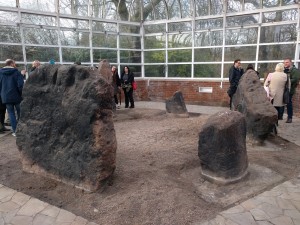Over a month back, at the start of April, Lela and I went to Liverpool for John Reppion‘s Spirit of Place conference, a site-specific event linked to the Calderstones, a group of standing stones in a Liverpool park.
I don’t know Liverpool well – I last went with my Dad and sister back in the nineties. But the list of speakers was so interesting that I thought it would be worth the trip. John Reppion described the event as something “people who live in London, or Brighton say, might be quite used to seeing advertised but which there never seem to be very many of up here in the North.” Brighton could definitely do with events like this one.
The day brought together a range of speakers, including archaeologists, psychogeographers, historians (an epic description of the wrecking of the RMS Tayleur), artists (a premier of short film The Menhir Motorway) and a magician. The sessions were incredibly inspiring while avoiding a game of psychogeography bingo, and I wanted to note down some of the things that I responded to. I came out of it fizzing with ideas, and things to follow up.
- John Reppion introduced the day with Invoking the Spirits of Place. It looked at some of the ways folklore connected with the park. Many of the trees had been brought from overseas, and he discussed the idea of tree spirits from different cultures. I loved the quote from Pope, his advice on gardening: “Consult the genius of the place”
- Kenneth Brophy (AKA The Urban Prehistorian) gave a fantastic talk on ancient monuments in cities and the response of local people. He talked in particular about the Cochno Stone, which was buried to protect it from locals, mentioning the shame many felt at not being trusted with the monument. We also saw examples of how prehistoric monuments in cities are often fenced off, producing the strange spectacle of caged standing stones. Personally, I’m still disappointed that Silbury Hill was inaccessible. With the Cochno stone, there are plans for a replica to be made and placed above it. May Miles Thomas has produced a short film, Cochno Stone Revealed.
- The session that influenced me most was one by David Southwell and Gary Budden on ‘Landscape Punk and Re-enchantment’. David spoke about how myth grows and escapes; where folklore comes from and what it’s for. He also talked about how walking is the best way to learn a place. There were some amazing turns of phrase in this session – “ghost soil”, “layers of story”, the “dark sediment of decomposing memory”,”every walk scuffs up… spirits”. David’s current project is Hookland, a fictional English county providing a chance to put back some of the weirdness in a conscious act of enchantment. “Landscape gives us the myth we need”
- Gary Budden spoke about landscapepunk, which he saw as emerging from anti-road movements and squatters, and a culture of visionary English music like Crass and Zounds – he saw punk as a type of folk music. The talk grappled with the risk of interests like nature writing and psychogeography creating a sort of “hippie nationalism”, a negative island culture. He also spoke about the trope of the “Lone White male author” with time and leisure who reported back to office workers. The books these men produced were not the world he knew, and he compared his childhood experience of birdwatching to the lyrical descriptions found in nature writing. These didn’t reflect the nature he knew, of damp sandwiches in car parks and the Really Wild Show
- Richard MacDonald worked as Heritage Story Maker, which is the best job title I’ve ever heard. If I knew that was a possibility, I’d never have become a programmer.
- It was good to see Cat Vincent talk again. When he announced that he was a practising magician, someone in the audience gasped ‘Oh wow!’. His talk, Where the Buddleia Grows made the point that when most of the world’s people live in urban areas, magic should not continue to privilege the rural above the urban. He also discussed how people say that history repeats itself, then suggested geography does not repeat, but it rhymes. He spoke about his own connection with buddliea, the ‘bombsite flower’. which often grows in the city. It was a lovely talk and well worth reading via the link.
- The final session was an interview with horror author Ramsey Campbell. It was fun to listen to someone I’d been reading for about 25 years, since I used to borrow Best New Horror collections from Harlow Library in the 90s (that shelf of horror was probably the only good thing about that town). Campbell talked about his connections with the local area, the shop where he first discovered Lovecraft, and about Bartleby the Scrivener as horror. His latest book is based on the folklore of Liverpool. He claimed that he’d made notes of ideas among his research and now was no longer sure which parts he had made up.
It was good to visit Liverpool, even if we didn’t have a long time there (we did our best to visit the Tate in 30 minutes, and made a fairly good go of it). We also stayed in a Beatles-themed hotel, with a night-manager who’d never been to the top floor until he showed us to our room. Terrible breakfasts, but fun decor.

All-in-all, it was well worth the journey and I’ll be keeping my eyes open for John Reppion’s future events. I also note that I’ve become the sort of person who is excited by megaliths










































































